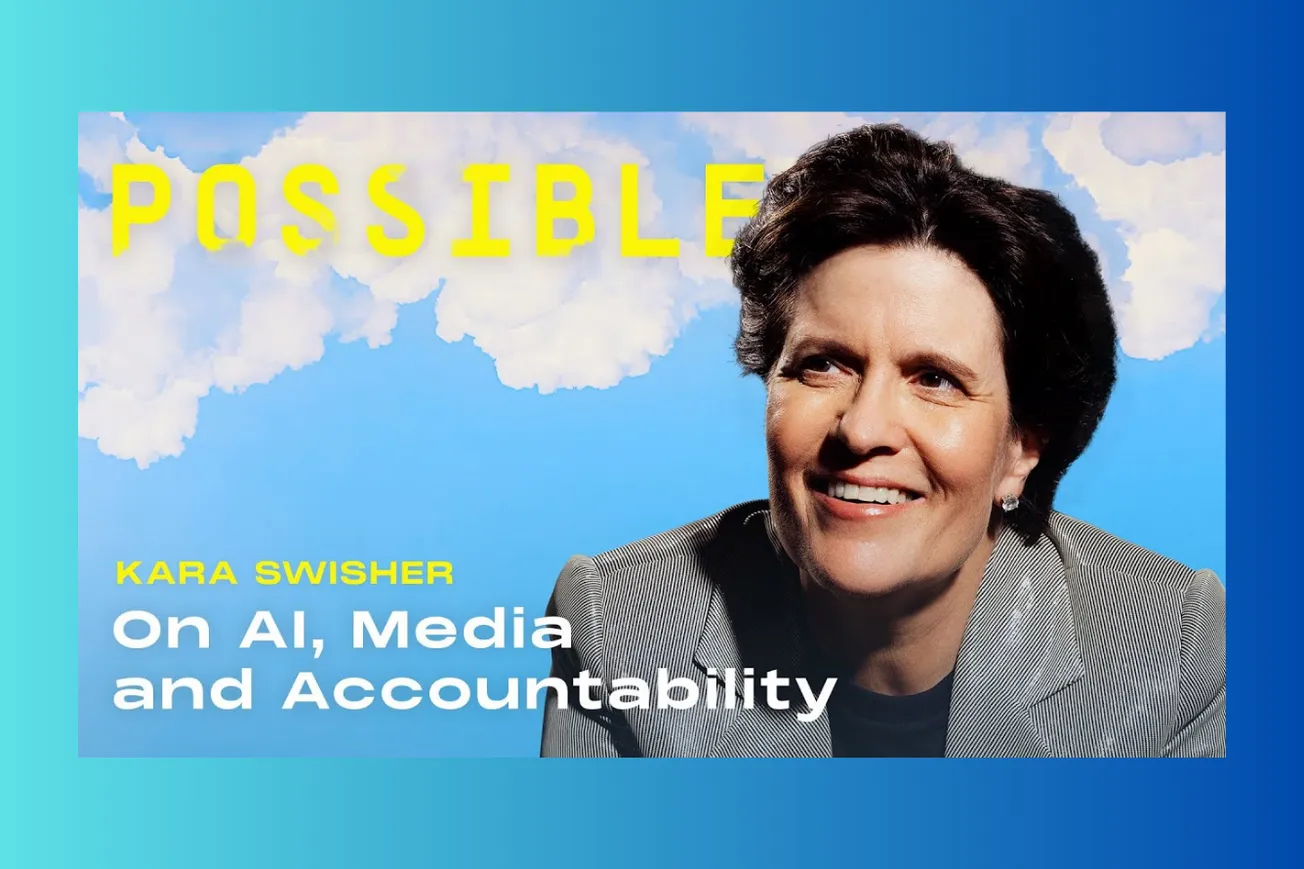Table of Contents
Veteran tech journalist Kara Swisher discusses AI's transformative potential in healthcare and climate tech, sharing insights on media evolution and corporate responsibility.
Key Takeaways
- AI-powered cancer research and gene folding represent the most promising technological developments of recent years
- Healthcare remains inefficient and data-heavy, making it ideal for AI transformation despite widespread digital disruption elsewhere
- Small-scale media organizations are thriving economically while large legacy outlets struggle with unsustainable cost structures
- Tech companies must pay fair compensation for content used in AI training rather than claiming dubious fair use
- Climate technology entrepreneurs demonstrate genuine mission-driven focus compared to other tech sectors
- The future depends on solutions-based thinking rather than divisive grievance politics that waste human talent
- Government regulation and press accountability remain essential checks on corporate power in the digital economy
AI's Healthcare Promise: Beyond the Hype
Swisher identifies AI-powered cancer research and gene folding as breakthrough developments that pull her toward optimism despite her "optimistic pessimist" worldview. Her perspective stems from personal experience with healthcare limitations. Having survived a stroke and lost her father to illness, she recognizes how much medical knowledge remains trapped in databases, making it "perfect for this kind of technology".
Healthcare's inefficiency creates unique opportunities for AI disruption. Unlike other industries transformed by digital technology, healthcare remains "heavily data oriented" yet "so inefficient" and largely unaffected by digital transformation. This combination of data richness and operational inefficiency positions healthcare as AI's most promising frontier.
The technology excels in idea-scarce environments where human expertise has natural limits. Medical professionals "can't know enough" and "there's not enough to read," making AI's ability to generate numerous possibilities from vast datasets particularly valuable. Even if most AI-generated ideas prove inadequate, the increased volume of potential solutions creates meaningful advantages.
Climate Tech's Mission-Driven Renaissance
Climate technology represents another area where Swisher sees genuine optimism breaking through. She finds climate tech entrepreneurs "very moving" and describes them as "much more Mission driven in a real way than everyone else" who merely "cosplays" purpose.
The sector attracts diverse technological approaches spanning fusion, geothermal, heat transfer, and innovative energy capture systems. These entrepreneurs focus on solutions rather than mitigation strategies, addressing long-term planetary challenges with immediate technological development.
Climate technology benefits from the same data-heavy characteristics that make healthcare promising for AI applications. Complex environmental systems generate vast amounts of information that traditional analysis methods struggle to process effectively. AI's pattern recognition capabilities offer new approaches to understanding and addressing climate challenges.
Media's Great Restructuring: Small Wins, Big Struggles
The media landscape has bifurcated into thriving small operations and struggling large organizations. Successful small-scale journalists like Casey Newton at Platformer achieve both economic success and content quality, operating like "very popular restaurants" that don't need massive scale.
These smaller operations benefit from direct audience relationships and lower overhead costs. Examples include Heather Cox Richardson, who "makes Bank" with history lessons, generating approximately "$5 million in Revenue" with minimal staff. The model proves that quality content can sustain profitable businesses without massive infrastructure.
Large media organizations face different challenges. Even successful outlets like the New York Times generate most traffic and revenue from "cooking and Wordle" rather than news, with revenues around "$2.4 billion" that pale compared to tech giants. Traditional media costs remain misaligned with current revenue realities, particularly in television where anchor salaries reflect outdated audience economics.
Digital advertising dominance by Meta and Google creates structural challenges for media companies. These platforms capture advertising revenue without bearing content creation costs, fundamentally altering the media industry's economic foundation.
The AI Content Compensation Debate
Swisher takes a firm stance on AI companies' use of media content for training. She argues AI companies should "just pay up" for content usage, comparing the practice to "shoplifting" rather than legitimate fair use. This represents a business negotiation rather than a legal impossibility.
Historical precedents from YouTube and music streaming demonstrate that initially contentious relationships between tech platforms and content creators can evolve into mutually beneficial arrangements. The key involves establishing fair compensation mechanisms that acknowledge content value while enabling technological innovation.
AI companies face pressure to develop sustainable business models beyond acquisition strategies. Current litigation from outlets like the New York Times represents negotiation tactics to establish licensing frameworks rather than attempts to halt technological progress entirely.
Political Technology: Tools and Weapons
Political applications of AI highlight technology's dual nature as both beneficial tool and potential weapon. Swisher references Microsoft's Brad Smith's concept of "tools and weapons," noting that politics "has always been a dirty business" where better cheating tools will inevitably be used.
The challenge isn't AI creating new forms of political manipulation but accelerating existing tactics. Traditional authoritarian strategies include "flood the Zone with misinformation," "say things that aren't true but then repeat them continually," and attempts to "pull down institutions". AI simply increases the speed and scale of these established approaches.
Tech platforms bear responsibility for managing harmful content on their systems. Swisher argues that companies creating massive information distribution systems must accept cleanup responsibilities rather than claiming immunity from downstream effects.
Corporate Accountability in the Digital Age
Technology companies require external governance mechanisms to balance profit motives with societal needs. Swisher emphasizes that companies exist to "making money for shareholders" and comparing expectations of corporate virtue to asking "why isn't Proctor and Gamble getting us to eat more carrots".
Effective oversight requires collaboration between press coverage, government regulation, and academic research. These institutions provide necessary checks on corporate power while avoiding stifling innovation through excessive interference.
The solution involves strengthening rather than weakening governmental capacity to monitor and regulate technology companies. Historical public-private partnerships in areas like internet development, space exploration, and vaccine research demonstrate successful models for channeling private innovation toward public benefit.
Common Questions
Q: What makes healthcare ideal for AI applications?
A: Healthcare combines vast data resources with operational inefficiency and knowledge limitations that AI can address effectively.
Q: Why do small media companies succeed while large ones struggle?
A: Smaller operations have lower costs, direct audience relationships, and don't need massive scale to achieve profitability.
Q: Should AI companies pay for training data?
A: Yes, fair compensation for content usage represents business negotiation rather than technical impossibility, following precedents from music streaming.
Q: How can society balance AI benefits with political risks?
A: Through strengthened institutions including press accountability, government oversight, and academic research rather than relying on corporate self-regulation.
Q: What role should government play in technology regulation?
A: Active monitoring and rule-setting while avoiding operational interference, similar to successful historical public-private partnerships.
Solutions Over Grievances: A Path Forward
The technology industry's future depends on prioritizing concrete problem-solving over divisive rhetoric. Current debates often focus on categorical distinctions rather than collaborative solutions to shared challenges. This approach wastes human talent and resources that could address pressing global issues.
Climate change and healthcare represent areas where technological solutions can create meaningful progress. Success requires mission-driven entrepreneurship combined with appropriate regulatory frameworks that encourage innovation while protecting public interests.





